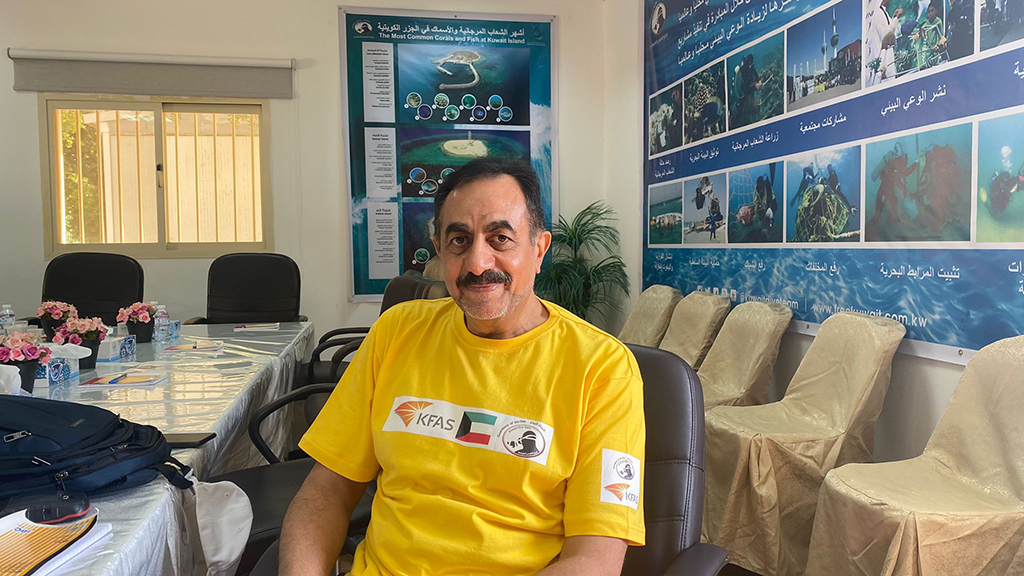By Faten Omar
KUWAIT: Healthy coral reefs support commercial and subsistence fishing. Scientists also develop essential drugs from coral reef organisms for cancer, arthritis and many other treatments. Head of Environmental Projects at Kuwait Dive Team Mahmoud Ashkanani explained to Kuwait Times the importance of coral reefs and why Kuwait should invest in safeguarding its environment.
Kuwait Dive Team recently discovered the presence of dense coral reef colonies of several types near the coasts, extending from Kuwait Towers to Ras Al-Salmiya, during a regular dive that was carried out to monitor coral reefs on the Gulf coast. This discovery is considered the first of its kind. Being passionate from the age of eight, Ashkanani was eager to explore the sea.
 Zoanthids
Zoanthids"I grew up loving the sea, and started with fishing. In the '80s, I tried to dive to see the corals, but my ears hurt, so I stopped. In the '90s, my friend taught me how to control the pressure in my ears, so I started diving again. When I first saw the corals, there was a connection - it was love at first sight! I took a diving course, and was amazed by the beauty of the sea. After that I decided to join the diving team in 1996," he told Kuwait Times.
His passion drove him to document every single piece of information about coral reefs, taking photos and videos, writing in his diary and recording coordinates of coral spots. "Since 1995, I started to document every detail about coral reefs, hoping it will be used in the future to search and develop our marine environment. Then as a team, we started to explore both hard and soft coral. I read a lot of books and discussed with many experts. I still study our Kuwaiti marine life every time I have a chance," Ashkanani said.
 Siderastreidae
SiderastreidaeRegarding the latest discovery, Ashkanani pointed out that the discovery of coral colonies in very difficult environments for coral growth and reproduction based on natural requirements is remarkable, noting that the development of coral in Kuwait and its adaptation to difficult and harsh conditions is considered a great discovery.
"Kuwait and the world suffered from great coral reef devastation due to bleaching, which led to the death of more than 75 percent of Kuwait's corals in 2010. Coral has great importance because it is characterized by the formation of environments with great diversity of organisms that settle inside it, and is considered one of the most important and most productive marine sites in biological diversity because it provides shelter to thousands of different organisms," Ashkanani explained.
 Poritidae
Poritidae"Its structures are natural buffers to protect coasts and islands from strong waves, and contribute to the formation and stability of coral islands, and form the sources of formation of beach sand. Also, coral reefs are considered one of the most important sites for tourism and recreation, in addition to being a source of many cosmetics, medical and building materials," he added
Ashkanani indicated that the team conducted a preliminary examination of the location of the coral colonies, revealing three types of corals were monitored - Siderastreidae, Faviidae and Poritidae, in addition to Zoanthids. They were of high density, with good colors and sizes of more than 80 cm at depths of 3 to 5 meters.
 Faviidae
FaviidaeAshkanani revealed there are 35 types of hard corals on the central coasts of Kuwait (from Kuwait Bay to Mina Abdullah). "Most corals form as isolated and in small colonies suspended on some scattered rocks in shallow water. The team has monitored several types of coral colonies whose sizes range from more than 30 centimeters on Asherij coast inside Kuwait Bay, but after the Fahaheel coast, the coral colonies begin to condense and form areas of small coral masses until they form large coral reefs. There are 20 coastal reef sites in Kuwait, including 15 sites in Doha Bneider. There are also semi-deep sites that have soft corals in large numbers around the southern islands at depths of 22 to 27 meters and deeper," he told Kuwait Times.
Ashkanani hopes that the data that was collected by the team should be utilized by experts and Kuwaiti institutions to explore coral reefs in an extensive and more detailed manner, or if there is a supporter for this project, to support in exploring coral reefs and expand its benefit on fishery and tourism.











